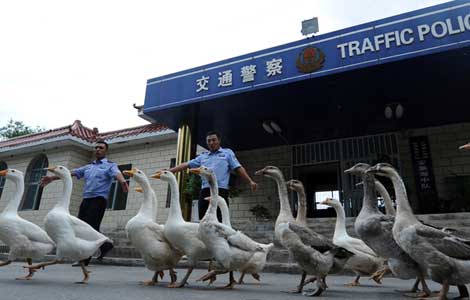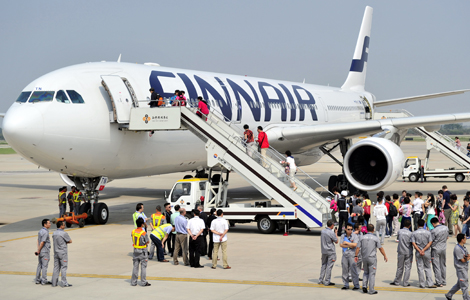New Zealand dairy giant Fonterra issues botulism alert
Updated: 2013-08-03 10:43
(Xinhua)
|
||||||||
WELLINGTON -- New Zealand dairy giant Fonterra is refusing to reveal what products might contain a potentially deadly bacteria or which countries are at risk - but the company has swung into damage-control mode in China.
Fonterra said on Saturday infant and child formula and sports drinks made from its whey products could contain Clostridium botulinum, which can cause botulism.
Symptoms include nausea, vomiting and diarrhoea, followed by paralysis, and it can be fatal if not treated.
Three batches of whey protein concentrate manufactured at Fonterra's Hauptau plant in Waikato, New Zealand's North Island, were contaminated in May last year by an unsanitary pipe.
The whey protein tested positive for Clostridium in March, but because most strains of the bacteria are harmless, Fonterra continued testing until Clostridium botulinum was identified on July 31 - after which it notified the Ministry for Primary Industries.
The dairy giant has advised eight of its customers that their products may be contaminated - and New Zealand products are understood to be among those potentially affected.
Fonterra's managing director of New Zealand milk products, Gary Romano, told a press conference in Auckland on Saturday that consumer safety is paramount, but the company is refusing to say which companies in New Zealand or overseas are involved.
"We don't believe that it would be helpful to give that information," he said, adding it was up to Fonterra's customers and their local regulatory authorities to locate any affected products and recall them.
Romano said the potential impact on someone consuming a contaminated product would depend on their age and the amount they consumed.
For an adult, a small amount of contaminated whey protein " would probably pass through unnoticed".
The dairy giant's chief executive Theo Spierings said they were doing everything they could to assist the eight customers affected in ensuring any product containing this ingredient is removed from the marketplace and that the public is made aware.
"Our focus is to get information out about potentially affected product as fast as possible so that it can be taken off supermarket shelves and, where it has already been purchased, can be returned," Spierings said.
Spierings will fly to China during the weekend to talk "widely" with local companies about the contamination.
In 2008, the company was caught up in a tainted milk scandal that left six Chinese children dead and sickened nearly 300,000 others. Fonterra, New Zealand's biggest exporter, sells 371,000 tonnes of infant formula each year to China.
In January, Fonterra products were found to have small levels of dicyandiamide, used in some fertilizers.
Romano said the Clostridium botulinum contamination was a complete surprise.
"We have never had any expectation that this would be found in our products," Romano said, adding that it is very rare for Clostridium botulinum to be found in dairy products.
Fresh dairy products like milk, yoghurt, cheese, spreads and UHT milk products are not affected.
New Zealand Ministry for Primary Industries said in a statement Saturday that it has advised overseas authorities that some products of dairy giant Fonterra may have been contaminated with a potentially deadly toxin.
The Ministry for Primary Industries said it is working closely with Fonterra on the food safety issue with a range of products manufactured from whey protein concentrate produced at a single New Zealand manufacturing site in May 2012, adding there have been no reports of illness linked to the consumption of the affected product.
The Ministry for Primary Industries said it has contacted the appropriate regulatory authorities overseas, and is focusing on ensuring there are no contaminated products on the New Zealand market.
"At present, we are continuing to verify information provided to us, and we will update further if any products are identified. Products on the market will be recalled if they are found to contain the contaminated protein," said MPI Acting Director General Scott Gallacher on Saturday.
"We are also working with Fonterra to establish what has happened, how it happened, and what can be done to ensure it does not happen again," Gallacher said.
Botulism is a rare but serious illness caused by a bacterium which occurs in soil. It produces a toxin that affects your nerves. Foodborne botulism comes from eating foods contaminated with the toxin. Intoxication botulism can result when food processing failure and/or temperature abuse allows germination of spores and proliferation of vegetative cells.
Initial symptoms include nausea, vomiting, and diarrhoea. Neurological symptoms follow, beginning with cranial nerve areas including eye, throat and mouth, and then travelling down the body paralysing motor nerves. Lack of muscle co-ordination, fatigue and respiratory impairment are characteristic. Constipation may develop after onset of neurological symptoms; abdominal pain may be present throughout.
Most cases (up to 80 percent) require hospitalization for a 4-5 week period. All botulinum interfere with neurotransmitters, a temporary condition eventually restored by motor endplate regeneration. Effects are not usually long term.

 Lords of illusion
Lords of illusion
 Berlusconi loses final appeal in landmark case
Berlusconi loses final appeal in landmark case
 Birds flock together to boost police ranks in Xinjiang
Birds flock together to boost police ranks in Xinjiang
 Right royal piece of paradise
Right royal piece of paradise
 Foreign carriers compete in 2nd-tier cities
Foreign carriers compete in 2nd-tier cities
 Urban push
Urban push
 Snowden granted 1 year's temporary asylum in Russia
Snowden granted 1 year's temporary asylum in Russia
 US kidnapper of 3 girls gets life in prison
US kidnapper of 3 girls gets life in prison
Most Viewed
Editor's Picks

|

|

|

|

|

|
Today's Top News
China, US hold dialogue on human right
FM urges restraint on sea issues
US issues travel alert over attacks
Relaxation of one-child policy still being mulled
Forum fights desertification
US urged to ease exports ban
Farmers see hope of city life in hukou reform
Singer's fake bomb threat sparks debate
US Weekly

|

|







